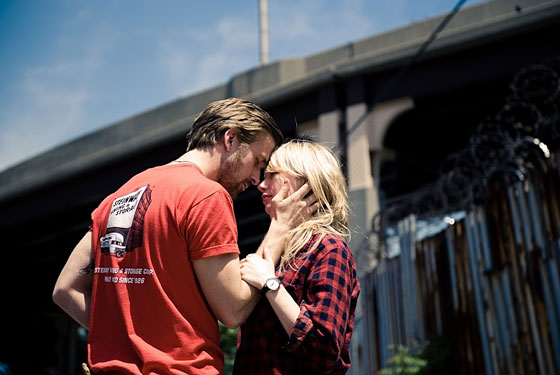
Three of the Sundance Film Festival’s most high-profile films debuted over the weekend. Sundance veterans Philip Seymour Hoffman and Mark Ruffalo found themselves in the odd position of being first-time filmmakers, with their directorial debuts Jack Goes Boating and Sympathy for Delicious, respectively. It was exciting to see both actors make the transition — but even more exciting to see actors Ryan Gosling and Michelle Williams stick to what they know best in Blue Valentine.
The first question after Philip Seymour Hoffman’s impressive, wrenching directorial debut, Jack Goes Boating: How influenced are you by Paul Thomas Anderson? It was unavoidable: Hoffman uses roving long shots, swelling music, and interlocking, heartbreaking stories much like Anderson, but filters it all through his own LAByrinth Theater sensibility, for a downbeat, two-couple drama adapted from Bob Gaudini’s play and starring himself, longtime collaborator John Ortiz, Amy Ryan, and Daphne Rubin-Vega. Everyone’s hurting, everyone’s struggling to connect, everyone is, honestly, a bit freakish. (Asked to describe her character’s motivations after the screening, Ryan just said, “She’s a weirdo.”) A less generous filmmaker (say, Todd Solondz, with whom Hoffman has worked before) would have turned these characters into quirky, freak-show punch lines, but Hoffman’s strength as a director is the same as his genius as an actor: His characters are never less than human. This is a small-scale film with a limited ceiling — it feels Off Broadway in the best way — but, so far, critical responses have been terrific and buzz is building fast.
On the other hand, Mark Ruffalo must not have wanted to make his directorial debut with something simple or self-contained. With Sympathy for Delicious, he takes a big risk with a very high-concept dare — and early responses have been far from enthusiastic. The big gambit? Christopher Thornton, who wrote the script, plays a paraplegic turntablist who lives in his car on skid row and wakes up one day to find that he can heal the sick with the touch of his hands. With the help of a priest, he begins laying hands on the desperate, then joins a turntable rock band (a buff Orlando Bloom on lead vocals; Juliette Lewis on bass), which is awful, but nevertheless capitalizes on his powers to become rich and famous. The moment this movie goes off the rails? When Orlando Bloom says the word heal-a-palooza in all seriousness. And the plot twists just keep coming. At its heart, the film is about healing and self-mending, but it’s doubtful anyone could have stitched together such a flawed premise.
Luckily, some actors just act. It’s hard to think of a better-cast young couple than Ryan Gosling and Michelle Williams in Derek Cianfrance’s Blue Valentine. Two of the most beautiful blonds in the business are also two of their generation’s most fascinating actors — and it’s a thrill to see them working together. In a time-jumping, beautifully shot drama, they fall in love and get married, and then things unravel. There’s a fascinatingly unhinged scenario that plays out in a cheap sex hotel’s “Future Room” and a spontaneous song-and-dance scene that couldn’t have been more charming. It might sound a bit like (500) Days of Summer, but this raw-nerve drama couldn’t be more different. It’s wrenching, and the actors earn it. So far, critics are raving about the two performances, especially the parts when they’re in bed (which makes for some of the festival’s hottest sex scenes). The main criticism overheard is that this battle of the sexes seems unfairly stacked against Michelle Williams’s lover and skewed in the favor of Gosling’s sexy charmer, who, perhaps unsurprisingly, looks almost suspiciously like the film’s writer-director, Derek Cianfrance.

